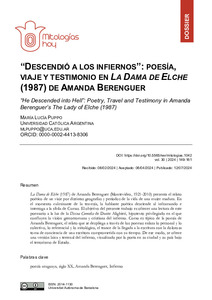Por favor, use este identificador para citar o enlazar este ítem:
https://repositorio.uca.edu.ar/handle/123456789/19043| Campo DC | Valor | Lengua/Idioma |
|---|---|---|
| dc.contributor.author | Puppo, María Lucía | es |
| dc.coverage.temporal | Siglo XX | es |
| dc.date.accessioned | 2024-11-15T10:56:23Z | - |
| dc.date.available | 2024-11-15T10:56:23Z | - |
| dc.date.issued | 2024 | - |
| dc.identifier.issn | 2014-1130 (online) | - |
| dc.identifier.uri | https://repositorio.uca.edu.ar/handle/123456789/19043 | - |
| dc.description.abstract | La Dama de Elche (1987) de Amanda Berenguer (Montevideo, 1921-2010) presenta el relato poético de un viaje por distintas geografías y períodos de la vida de una mujer madura. En el momento culminante de la travesía, la hablante poética desciende al inframundo e interroga a la sibila de Cumas. El objetivo del presente trabajo es ofrecer una lectura de este poemario a la luz de la Divina Comedia de Dante Alighieri, hipotexto privilegiado en el que confluyen la visión grecorromana y cristiana del infierno. Como es típico de la poesía de Amanda Berenguer, el relato que se despliega a través de los poemas enlaza lo personal y lo colectivo, lo referencial y lo mitológico, el trance de la llegada a la escritura con la dolorosa toma de conciencia de una escritora comprometida con su tiempo. De ese modo, se ofrece una versión laica y terrenal del infierno, visualizado por la poeta en su ciudad y su país bajo el terrorismo de Estado. | es |
| dc.description.abstract | The Lady of Elche (1987) by Amanda Berenguer (Montevideo, 1921-2010) presents the poetic tale of a journey through different geographies and periods in the life of a mature woman. At the climax of the journey, the poetic speaker descends into the underworld and interrogates the Sibyl of Cumae. The aim of this paper is to offer an interpretation of Berenguer’s book of poems in the light of Dante Alighieri's Divine Comedy, a privileged hypotext in which both the Greco-Roman and Christian vision of hell come together. As is typical of Amanda Berenguer's poetry, the story that unfolds through the poems links the personal and the collective, the referential and the mythological, the trance of arriving at writing with the painful awareness of a writer committed to her time. In this way, a secular and earthly version of hell is offered, visualized by the poet in her city and her country under state terrorism. | es |
| dc.format | application/pdf | es |
| dc.language.iso | spa | es |
| dc.publisher | Universitat Autònoma de Barcelona | es |
| dc.rights | Atribución 4.0 Internacional | * |
| dc.rights.uri | http://creativecommons.org/licenses/by/4.0/ | * |
| dc.source | Mitologías hoy. Revista de pensamiento, crítica y estudios literarios latinoamericanos. 2024 (30). | es |
| dc.subject | Berenguer, Amanda, 1921-2010 | es |
| dc.subject | LITERATURA URUGUAYA | es |
| dc.subject | POESIA URUGUAYA | es |
| dc.subject | INFIERNO | es |
| dc.title | “Descendió a los infiernos”: poesía, viaje y testimonio en La Dama de Elche (1987) de Amanda Berenguer | es |
| dc.title | “He descended into hell”: poetry, travel and testimony in Amanda Berenguer’s The Lady of Elche (1987) | es |
| dc.type | Artículo | es |
| dc.identifier.doi | 10.5565/rev/mitologias.1042 | - |
| uca.disciplina | LITERATURA | es |
| uca.issnrd | 1 | es |
| uca.affiliation | Fil: Puppo, María Lucía. Pontificia Universidad Católica Argentina; Argentina. | es |
| uca.version | publishedVersion | es |
| item.fulltext | With Fulltext | - |
| item.grantfulltext | open | - |
| item.languageiso639-1 | es | - |
| crisitem.author.dept | Facultad de Filosofía y Letras | - |
| crisitem.author.dept | Departamento de Letras | - |
| crisitem.author.dept | Centro de Estudios de Literatura Comparada "María Teresa Maiorana" | - |
| crisitem.author.dept | Consejo Nacional de Investigaciones Científicas y Técnicas | - |
| crisitem.author.orcid | 0000-0002-4413-8306 | - |
| crisitem.author.parentorg | Pontificia Universidad Católica Argentina | - |
| crisitem.author.parentorg | Facultad de Filosofía y Letras | - |
| crisitem.author.parentorg | Departamento de Letras | - |
| Aparece en las colecciones: | Artículos | |
Ficheros en este ítem:
| Fichero | Descripción | Tamaño | Formato | |
|---|---|---|---|---|
| descendio-infiernos-poesia.pdf | 368,1 kB | Adobe PDF |  Visualizar/Abrir |
Este ítem está sujeto a una Licencia Creative Commons

